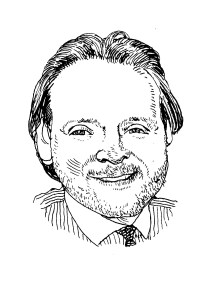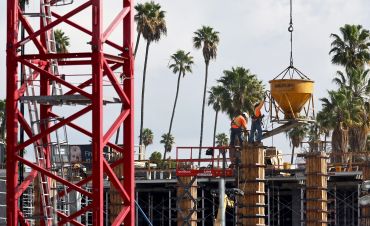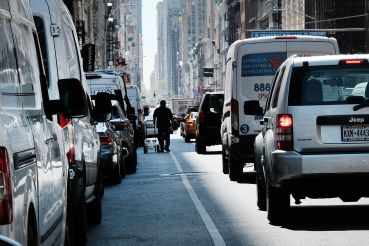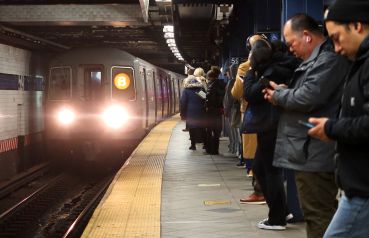
The other day, I was walking around the city taking photographs of buildings for a marketing brochure I am putting together. I was using my old Polaroid Land Camera–you know, the one where the photograph slides out of the front of the camera and develops right before your very eyes. As I was standing in the street taking the photos, I nearly got run down by a horse and buggy that was racing past me up Madison Avenue. The buggy was traveling at a speed much faster than allowed by law, so I pulled my cell phone out of my backpack to notify the police. My cell is the size of a brick and gets rather poor reception, so I wasn’t able to complete the call.
Feeling frustrated and wanting to report the buggy driver, I went into the Betamax video store to ask if I could use their phone to call 911. While waiting to use their phone, I looked at some fantastic 8-track tapes lining the walls of the shop. Unfortunately, the phone in the Betamax store was not working, either, so I went next door to the blacksmith shop and asked if I could use their phone. The blacksmith said he was happy to let me use his phone, but he wanted to show me the new line of buggy whips that he had just put on display.
At this point you must be thinking, “Knakal has lost his marbles.” However, this scenario might just be today’s reality had New York’s current legislators been around for the past several decades.
You see, I would have had to use a Polaroid camera because new technologies would have not been allowed into the city because they would hurt the small businesses that sold the Polaroids. Similarly, CDs and digital audio/video equipment would not have been allowed to pass through the city’s borders because of the negative impact they would have on Betamax sellers and stores that sold 8-tracks. And, of course, those job-killing automobiles would never have been allowed to cross bridges and tunnels into the Big Apple for fear that they would put horse-and-buggy drivers, blacksmiths and buggy-whip manufacturers out of business. All these prohibitions would have been legislated with the virtuous objective of “saving small business.”
Contrarily, one of the many great things about New York City is the constant desire of companies and individuals to come here to compete. This competition drives businesses to innovate, excel, create new products or figure out how to deliver a better level of service. New businesses need to do business in different ways, looking to differentiate services and products, or they just won’t make it. Competition drives entrepreneurs to figure out new ways to compete, to bring new concepts to the marketplace and to figure out how to present better products, offer better value and deliver better services to New Yorkers. If you are not better in some way, it is a challenge to compete.
The fight over Wal-Mart, and whether it should come into the city, is seemingly based on similar principles, with “save our small businesses” as the mantra of the retailers’ foes. Opponents of Wal-Mart, including those on the City Council, and most notably the public advocate, use preservation of small business as the keystone to their argument for not wanting the retail giant to enter the city.
But let’s face facts. Politics has devolved into a business in which the first priority of an elected official, after getting elected, is to get reelected. The good of the taxpayer all too often takes a back seat to the objectives of elected officials, who are out to sustain their political careers.
A massive amount of financial support that organized labor can, and often does, bestow upon candidates is clearly impacting positions taken by opponents of Wal-Mart coming to the city. This, however, is a risky position for politicians to take. While the position will make unions happy and increase the likelihood of labor’s financial backing, a recent poll of New York City residents indicated that 71 percent would like Wal-Mart to operate within city limits.
The desire to have Wal-Mart here is not surprising given that city residents travel outside New York to spend approximately $195 million per year at Wal-Mart stores in the surrounding metro area. Wouldn’t it be better for New York to have this economic activity occur in the city rather than in New Jersey or Connecticut?
Moreover, New York City is Wal-Mart’s No. 1 market for its online division.
CLEARLY, WAL-MART WOULD do well in New York City, creating jobs and providing city residents with the ability to choose among a larger selection of products at more affordable prices. The desire for political financial support is outweighing the desire to give New Yorkers an option to buy products less expensively. Why would elected officials protect small businesses that unfairly charge higher prices to consumers, especially when unemployment levels are so high and so many New Yorkers are concerned about their finances?
In a recent survey that we conducted, we visited a Wal-Mart store just outside the city and compared prices to three different retailers here in town: a national drug store train, a local neighborhood pharmacy and a small neighborhood convenience store. In all cases, the prices of identical products at Wal-Mart were lower than the prices available at the New York City stores. The difference in price ranged from a low of 26 percent in savings on Benadryl, to as much as a 134 percent savings on Listerine. On average, Wal-Mart prices were 52.4 percent less than identical products available in the city.
Opponents of Wal-Mart say that the retailer should not be allowed entry due to the tremendous competitive advantage that it has over small businesses. What is difficult to understand is why Wal-Mart is singularly being vilified when there are other national retailers that offer economies of scale to New York City consumers, including Duane Reade, Walgreens, Costco, Target, CVS, T.J. Maxx and Staples.
Why not allow Wal-Mart to come in and compete with existing businesses? Those businesses would simply have to step up, compete and in some way differentiate themselves or their products-the epitome of the free-market system.
If opponents ideologically believe that a large global company that benefits from economies of scale negatively impacts small businesses and, therefore, should not be allowed in the city, then I should draft a letter to the City Council and the public advocate asking them to banish CB Richard Ellis, Cushman & Wakefield and Jones Lang LaSalle from the city. How absurd would that be? (Clearly, I would never do this, as I have many friends at these firms and believe that free-market competition brings out the best in people.)
THE LARGER PROBLEM with elected officials interceding in this way is that it is extraordinarily dangerous when they start dictating which businesses are free to join the competition and which businesses are not.
Let’s take for example the debacle that the Kingsbridge Armory has turned into. The Kingsbridge Armory is a hulking building in the Bronx that has been underutilized for far too long. The city has spent millions of dollars on upkeep, and the property has generated no property taxes for decades. A private-sector developer was prepared to invest $310 million of capital into the building, but restrictions placed on the developer by elected officials killed the project.
At the time, opponents of the proposed private-sector development stated that they would rather have no jobs than jobs that they didn’t deem to be appropriate. Clearly, this did not represent the opinions of the tens of thousands of jobless residents in the Bronx, where the unemployment rate remains at 12 percent today, the highest in the state. This rate is only about 2 percentage points lower than the peak rate of 13.9 percent experienced in January of 2010, right around the time when this development was sledgehammered by politicians. Elected officials required that a living wage be paid by all tenants that were to occupy space within a redeveloped armory, an unreasonable request. This folly instantaneously vaporized 2,000 desperately needed jobs.
During a meeting I had with an elected official who was an outspoken opponent of the proposed redevelopment, he admitted that he had underestimated the negative impact that a living-wage requirement would have on it.
So here we sit, 16 months later, and the status quo exists. Two thousand people have not received gainful employment in the Bronx, no real estate taxes are being collected by the city and no prospects for a viable utilization of this facility are on the horizon.
We have yet to see any of the opponents of the project come up with $310 million of their own to put into rehabilitating this property. One of the arguments the opponents of Kingsbridge used was the protection of small businesses and the impact a large retail facility, with national retailers, would have on local small businesses.
Not allowing competition stifles innovation and impedes progress. Wal-Mart would be good for New Yorkers and for New York. Moreover, singling out one company and telling them they cannot come to New York is bad for the city. I would like to write more about this, but my horse and buggy is waiting for me, and I can’t keep the driver waiting.
rknakal@masseyknakal.com
Robert Knakal is the chairman and founding partner of Massey Knakal Realty services and in his career has brokered the sale of more than 1,125 properties, having a market value in excess of $7 billion.


